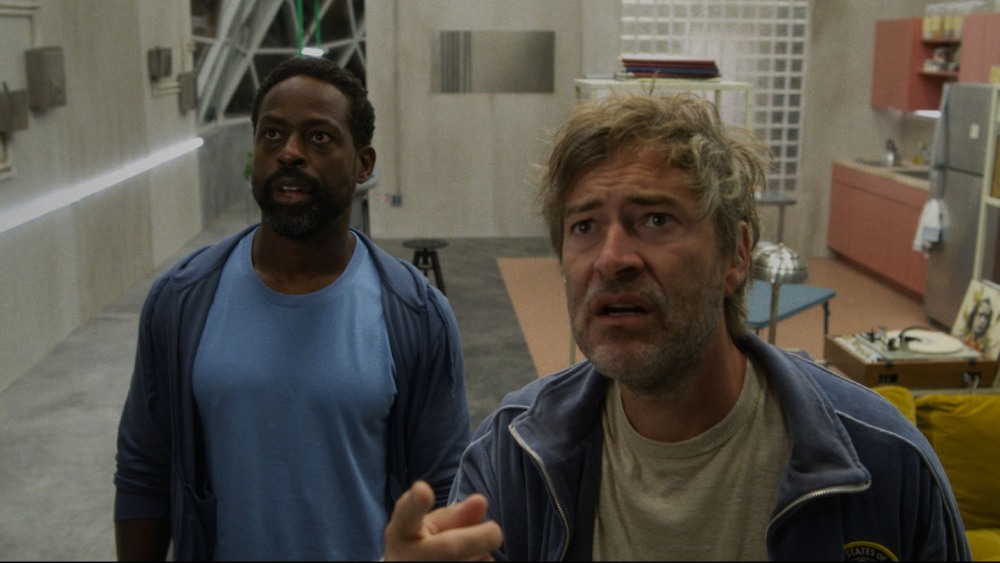‘Biosphere’ Review: An Endearing Comedy About the End of the World
In the diverse annals of survivalist cinema, one lesson is clear: Death is surely preferable to an eternity (or even 95 minutes) spent trapped with the inimitable duo of Pauly Shore and Stephen Baldwin in 1996’s “Bio-Dome.” By contrast, the dystopian-future-style living is pretty easy to take in “Biosphere,” given the more amiable company of stars Sterling K. Brown and Mark Duplass. They play besties stuck for the long haul in a self-sustaining habitat after some murky catastrophe has rendered the world outside lethal.
This first directorial feature for producer Mel Eslyn (who co-wrote with Duplass) is a somewhat uneven construct that at times threatens to exhaust its bro-comedy goodwill. But ultimately the performers are winning enough, and the ideas in the ambiguous story intriguing enough, to achieve an end result of successful middleweight charm and substance.
We never do find out the cause or nature of the environmental apocalypse that has presumably snuffed out all earthly life unequipped with a refuge like our protagonists’. But we do quickly suss their own natures, separately and as a duo: Scientist Ray (Brown), who built this experimental shelter, is the pragmatic and patient balance to antic Billy (Duplass), his BFF since childhood. Introduced during their “2001”-esque daily jog around the circular space’s perimeter, they quickly flow from discussion of Super Mario Bros. lore to towel-snapping horseplay. When Ray proclaims Billy a “giant manbaby,” Billy doesn’t object.
Though both naturally miss what was lost some years ago — including the society of women, as well as society in general — one suspects the way they’re forced to spend their days now isn’t so different from how they spent a majority of time “before” (i.e., in mutual yakking, joking, snacking, reading and playing video games). With the “view” from their man-sized terrarium permanently dark, the sky an inky black, it’s like a never-ending boys’ slumber party. They are fortunate to keep each other amused, given the severe limits of their experiential options.
But then signs of unexpected change arrive. A mysterious green light appears in the distance, possibly bringing either doom or an atmospheric restoration as it slowly approaches. The last female fish in their tank expires, suggesting an eventual end to food-source reproduction — definitely bad news. Yet one of the male survivors begins showing signs of “accelerated evolution” to compensate, its body shedding some gender characteristics and acquiring others, thus outfoxing extinction.
It’s pretty weird, however, when one of their human minders finds he’s undergoing the same process.
At first this development stirs a predictable array of “ewww” humor focused on the horror of dicklessness and the threat of sorta-gay sexuality. Fortunately, that unpromising terrain proves just a fleeting awkward phrase, as the pair evolve in psychological as well as physiological ways.
“Biosphere” is hardly the most sophisticated exploration of masculinity, homophobia and other issues that have become hot buttons in our era. Yet there is something endearing about the way it probes them by means that are pleasantly silly, without being trivializing.
Attempting to grasp Mother Nature’s apparent willingness to hazard a do-over, Ray ponders, “Do humans deserve another chance?” After all, it’s suggested, they did already pretty much wipe out every species on their own. It is a measure of this goofy tale’s stubbornly optimistic center that after a certain point we realize Ray and Billy deserve it — transitioning from buddies to couple without losing their innermost selves, they’ve somehow come to encapsulate life’s own mysterious ability to endure.
That’s a tricky path that the film occasionally stumbles on. At first we wonder if oft-histrionic Billy is going to be too much of an annoyance, and how impressively even-tempered Ray puts up with it. But Duplass’ performance gradually acquires more ballast as Brown’s becomes more playful, and their rapport has a relaxed, lived-in quality that helps us swallow the whimsical premise.
This mix of sci-fi, gender studies and dude comedics might easily have failed to gel, or come off as stagey and didactic. But Eslyn and her collaborators keep things visually fluid on production designer Megan Fenton’s soundstage set, achieving an admirable lightness of touch in complicated sequences like a montage (set to a song by Toronto retro-pop-rockers Zeus) wherein our heroes’ relationship significantly shifts of its own accord. “Biosphere” also finesses a sex scene that — summing up the film’s strengths overall — is simultaneously funny, rude, entirely inexplicit and rather sweet.
“Biosphere” opens in more than 25 U.S. theatrical markets, as well as on demand, on July 7.

